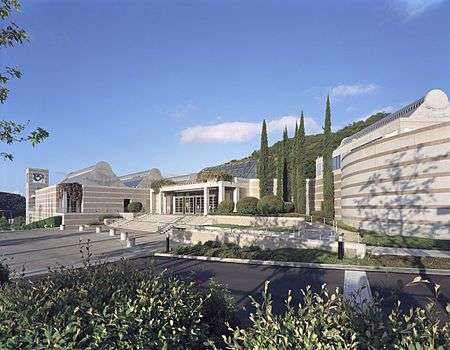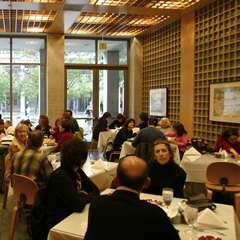Skirball Cultural Center

The Skirball Cultural Center is an educational institution in Los Angeles, California devoted to sustaining Jewish heritage and American democratic ideals. It has been open to the public since 1996. The Center, named after philanthropist-couple Jack H. Skirball and Audrey Skirball-Kenis, features a museum with regularly changing exhibitions, film events, music and theater performances, comedy, family, literary and cultural programs. The campus includes a museum, a performing arts center, conference halls, classrooms, libraries, courtyards, gardens, and a café.
Skirball Museum

The Skirball Museum predates the Skirball Cultural Center, having been established in 1972 at the Hebrew Union College-Jewish Institute of Religion in L.A. The Museum moved into the Skirball Cultural Center after the center's completion. The Skirball’s core exhibition, Visions and Values: Jewish Life from Antiquity to America, traces the history, experiences and values of Jews over 4,000 years. Featuring changing displays of works from the Skirball’s museum collection, the exhibition’s galleries contain multimedia installations, rare artifacts, historical documents and photographs, works of fine art, interactive computer stations and sound recordings that lead visitors on the Jewish people’s journey, culminating with their experiences in the United States.
Comprising more than 30,000 objects, the Skirball’s museum collection includes archaeological artifacts from biblical and later historical periods; Jewish ceremonial objects from countries all over the globe; an extensive group of Old World Jewish objects; the Project Americana collection, comprising objects that document the “everyday life of ordinary people” in the United States since the 1850s; and works of fine art in a variety of media.
Skirball Architecture

Designed by Israeli-born architect Moshe Safdie, the campus of the Skirball Cultural Center is in the Santa Monica Mountains.
Noah's Ark at the Skirball
The Noah’s Ark galleries were designed by Olson Sundberg Kundig Allen Architects of Seattle. Partner Jim Olson was the lead designer of the ark and Principal Alan Maskin designed the interactive exhibits and provided art direction for the project, including the design of nearly 300 animals. Brooklyn-based designer/puppeteer Chris M. Green created additional life-sized animals, many of them puppets to be operated by gallery staff. Outdoors, the Noah’s Ark experience includes a rainbow mist installation developed by Moshe Safdie, the architect of the Skirball Cultural Center, in partnership with environmental artist Ned Kahn.
Skirball Public Programs
The Skirball presents a range of music, theater, poetry, literary, film and other performing arts.
Skirball as Educator

The Skirball annually serves approximately 60,000 schoolchildren and teachers representing virtually every religious and ethnic background in Southern California. The Skirball’s school outreach programs in cultural history and performing arts draw visitors from all over the region. The family-oriented discovery center, which includes a simulated dig site and field tent, offers a look at the archaeology of ancient Israel and the Near East. Family programs take place regularly and attract new and returning visitors for entertainment and education. Highlights include toddler classes, children’s concerts, art and music workshops, archaeological dig workshops, readings, summer camps and the annual Hanukkah Family Festival. The Learning for Life department offers adult education courses in comparative religion and culture, art, creative writing, literature and the American Jewish experience.
Skirball Members and Supporters
The Skirball accomplishes its mission thanks to the generosity and active participation of thousands of individuals from all walks of life across the United States and abroad, including more than 7,000 members, volunteers and docents; foundations and corporations; and governmental funding agencies.

Sources
- Cinema's Legacy at the Skirball, AFI
- Skirball Foundation pledges $2 million for new chair, January 17, 2003
- Lori Starr named Director, Skirball Museum
- About the Skirball
- Philosophy of the Skirball